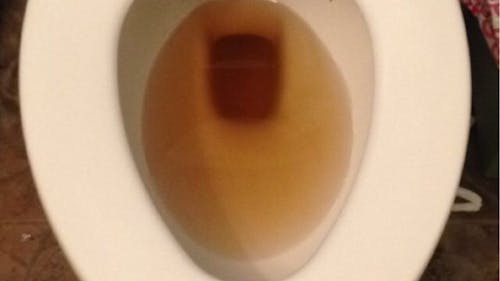Students note discolored water in Rutgers buildings

Anthony Rizzo was confused when he turned on a shower faucet in his New Gibbons residence hall and discovered brown water. He was left confused as to what was causing the discoloration.
Rizzo said his fellow residents did not shower because of the discolored water. Rizzo's resident assistant hold him that the discoloration was due to New Brunswick flushing out the fire hydrants. After running the water, Rizzo said it ran clear.
Numerous students have complained about brown water coming out of Rutgers’ pipes, making them feel skeptical about drinking from their own faucets.
Rutgers Environmental Health and Safety (REHS) typically receives a couple of calls each semester about brown or discolored water, said University spokesperson E.J. Miranda.
Many incidents of discoloration are due to a break or repair of a water main, renovation, construction activities, heavy water usage such as the fire department putting out a fire or the flushing of fire hydrants, Miranda said.
“Most of the water provided to Rutgers, including off-campus housing, is supplied from public utilities,” he said. “Public utilities are required to test for lead and other contaminants, maintain pH levels or add inhibitors to prevent corrosion and inform the public of the results.”
Rutgers ensures the water is safe to drink by reviewing all testing data provided by the New Jersey Department of Environmental Protection (NJDEP) regarding the quality of water provided by the various water suppliers, he said.
“New Brunswick is actively flushing hydrants throughout the city during the month of October, and this may have contributed to recent incidents of brown water,” Miranda said. “There was also a pipe break approximately a week ago that may have also affected the color of the water on the Douglass campus.”
If New Brunswick is going to flush out the hydrants resulting in the brown water, Rizzo said students should be notified in advance.
“I definitely think we should be told about this either via email or by our resident assistant,” Rizzo said. “This is also something that could cause an issue if it gets ingested, and it did give some of us a huge inconvenience for some of the my other dorm members."
In the event a student discovers brown or discolored water, the water does not pose a health hazard to the students, Miranda said. If the water comes out of the tap discolored, students should allow the water to run until it becomes clear.
“When REHS receives a complaint of discolored water, we will reach out to the Rutgers Utilities Department and the local water utility to determine the status of the water systems,” he said. “For example, if there has been a break in a water pipe, fire department activity or construction activity, we may also conduct a site visit to evaluate a complaint.”
Rutgers has installed water dispensing stations for drinking and filling water bottles at many locations throughout the campuses. These water dispensing stations are filtered and remove nearly all the contaminants in water that make it unaesthetic and hazardous to drink, Miranda said.
“These stations promote sustainability by reducing the volume of waste generated from bottled water and they contain filters that are tested and certified to reduce 99 percent of aesthetic effects such as chlorine taste or odor and lead,” he said.
Nick Huber is a School of Arts and Sciences senior majoring in journalism and media studies. He is a staff writer for The Daily Targum. He can be found on Twitter @njhuber95Huber.



